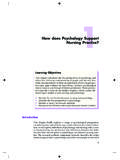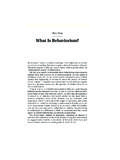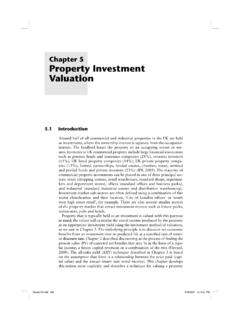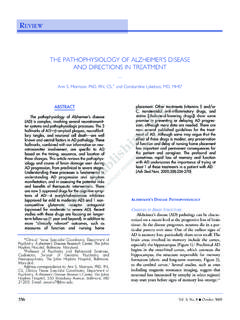Transcription of Abnormal Psychology 15 - Wiley-Blackwell
1 CHAPTER OUTLINELEARNING OBJECTIVESINTRODUCTIONWHAT DOES Abnormal MEAN?WHAT CAUSES Abnormal BEHAVIOUR?Biology and geneticsPsychodynamics and the parent child relationshipAttachment and securityLearned behaviourDistorted thinkingIntegrative modelsDISORDERS SYMPTOMS AND CAUSESS chizophrenia a living nightmareMood disorders depressionAnxiety disorders when fear takes overEating disorders bulimia and anorexiaSubstance use disorders abuse and dependencePersonality disorders a way of beingFINAL THOUGHTSSUMMARYREVISION QUESTIONSFURTHER READINGA bnormal 1/2/05 3:43 pm Page 314 Learning ObjectivesBy the end of this chapter you should appreciate that:nabnormal Psychology (or psychopathology) deals with sets of behaviours or symptoms that produce a functionalimpairment in people s lives.
2 Npsychological disorders ( schizophrenia) have been documented across time and culture;nthroughout history, the causes of Abnormal behaviour have been construed from a number of differentperspectives;nbiological/geneti c models focus on brain defects, biochemical imbalances and genetic predispositions as causesof psychopathology;nFreudian, contemporary psychodynamic and attachment models focus on the effects of early parent childexperiences;nbehavioural models focus on the learning experiences that result in psychopathology;ncognitive models focus on the effect of distorted thought processes;nthe diathesis stress perspective suggests that the factors identified by each of the other models may work inaccordance with one another;nthe developmental psychopathology perspective provides a framework for understanding how psychopathologydevelops from childhood to adulthood;nthese perspectives can help us understand the numerous disorders documented in classification systems such asthe DSM-IV and the ICD-10;nthere are several major forms of psychopathology, including schizophrenia, mood disorders, substance abuse,eating disorders and personality Psychology is the study of mental dis-orders (also called mental illness, psychologicaldisorders or psychopathology) what they looklike (symptoms), why they occur (etiology), howthey are maintained, and what effect they have onpeople s disorders are surprisingly common.
3 Forexample, a study conducted by the World HealthOrganization examined the prevalence, or frequency,of mental disorders in people visiting medicaldoctors in primary care settings in 14 figure shows, the study revealed that 24 per cent of these people had diagnosablemental disorders and another 10 per cent hadsevere symptoms of mental disorders ( st n &Sartorious, 1995). 1/2/05 3:43 pm Page 315316316 Abnormal PsychologyPsychopathology can happen to anyone andaffects many people around them there is noage, race or group that is immune. Furthermore,many people experience more than one disorderat the same time (see figure ).The frequency and widespread suffering causedby mental disorders makes our understanding ofthem abnormality is deceptively difficult.
4 When asked todescribe Abnormal behaviour, people typically say that it occursinfrequently, is odd or strange, is characterized by suffering, or isdangerous. All of these are reasonable answers for some types ofabnormal behaviour, but none of them is sufficient in itself, andmaking them all necessary results in too strict a parsimonious and practical way to define abnormalbehaviour is to ask whether the behaviour causes impairmentinthe person s life. The more abehaviour gets in the way ofsuccessful functioning in animportant domain of life(including the psychological,interpersonal and achieve-ment/performance domains),the more likely it is to be considered a sign of abnormality. Whenseveral such behaviours or symptoms occur together, they mayconstitute a psychological disorders are formally defined in widely usedclassification systems, or nosologies: the International Classifica-tion of Diseases 10th edition (ICD-10; World Health Organiza-tion, 1992) and the Diagnostic and Statistical Manual of MentalDisorders 4th edition (DSM-IV; APA, 1994).
5 Although they differfrom one another in format, these two systems cover the samedisorders and define them in a similar DOES Abnormal MEAN?Importantly, both the ICD-10 and the DSM-IV require that the level of impairment a person is experiencing be taken intoaccount when deciding whether they meet criteria for any mentaldisorder. For example, the DSM-IV diagnostic criteria for depres-sion specify that: The symptoms cause clinically significant dis-tress or impairment in social, occupational, or other importantareas of functioning (p. 327). The ICD-10 description of depres-sion also states: The extent of ordinary social and work activitiesis often a useful general guide to the likely degree of severity ofthe episode (p. 121).Finally, it is important to be sensitive to how contextual factorsaffect judgements about abnormality, so as not to over- or under-pathologize groups or individuals.
6 Such factors include ethnicityand culture, gender, age and socio-political values. For example,homosexuality was once listed as a disorder in the DSM, but, associo-political values changed to become somewhat more liberaland accepting, it was a basis for understanding how to define abnormalbehaviour, we can focus on its causes. Abnormal behaviour isconstrued from a number of different perspectives. Each of thefollowing models tells us something about different aspects of amulti-faceted group of mental CAUSES Abnormal BEHAVIOUR?% of patientsCurrent mentaldisorder4035302520151050 SubthresholddisorderSymptomaticWell% of population3 or more01 Number of disorders26050403020100 Figure of current mental disorder in patients presentingto primary care facilities across the world.
7 Source: Adapted from st n and Sartorius (1995).Figure in lifetime rates of mental disorders. Co-morbidity is the occurrence of two or more disorders atthe same time. Of the 48 per cent of people reportinglifetime history of disorder in this study, over half reportedtwo or more simultaneous disorders. These data comefrom a survey in the US, but similar rates of comorbidityhave been found in countries around the world. Source: Kessler et al. (1994).impairmentextent to which a behavi-our or set of behaviours gets in the wayof successful functioning in an import-ant domain of the individual s 1/2/05 3:43 pm Page 316 What Causes Abnormal Behaviour?317317 BIOLOGY AND GENETICSB iological and genetic models assert that mental disorders are dis-eases, and symptoms of mental disorders are caused by factorssuch as brain defects (abnor-malities in the structures ofthe brain), biochemical imbal-ances(complex dysregulationprocesses involving variousneurotransmitters) and geneticpredispositions(risk for psycho-pathology carried via ourgenetic material).
8 By and large, the evid-ence for brain defects andbiochemical imbalances ascauses of mental disorders is correlational, which means that,although we know that such biological problems occur amongpeople with mental disorders, we don t know whether they actually cause the disorder. Because the brain is a fairly malle-able organ, our behaviour and experiences can also affect ourbrain functioning, suggesting that the association between biology and Abnormal behaviour may be reciprocal rather models of mental disorder suggest that psychopatho-logy is inherited from parents, and there is certainly evidence forthe familial transmissionofmany disorders. For example,monozygotic (identical) twinsshould be more likely thandizygotic (fraternal) twins tohave the same disorder because they share 100 per cent of theirgenetic material, whereas dizygotic twins share only 50 per many disorders, this is exactly what research given that monozygotic twins share 100 per cent of theirgenetic material, you might expect them to have the same dis-orders 100 per cent of the time.
9 But in fact they have the same disorders only about 50 per cent of the time. These findings haveled researchers to conclude that, rather than being deterministic,genetics contributes about 50 per cent of the risk for mental ill-ness. Such findings show that it doesn t make sense to questionwhether mental illness is a function of nature ornurture. Insteadwe need to focus on how the two AND THE PARENT CHILDRELATIONSHIPF reud emphasized the role of the early parent child relationshipin the development of mental illness. According to Freud, to theextent that the child did not successfully negotiate the psycho-sexual stages (see chapter 14), mental illness would Freud didn t focus on what actually occurred in the parent child relationship ( whether parents were actually poor care-takers).
10 Instead, his focus was on the unconscious internal desiresand motivations of the child ( sexual and aggressive impulses)and how the child negotiated them as s/he progressed throughthe early relationship with the child s parents. For example, if an adult male found himself unable to deal with authority figures,this might be interpreted as unresolved aggressive impulses to-wards his father. Whether his father behaved as a harsh authorityfigure or not would be considered less relevant. So, according toFreud, mental illness is due to intrapsychic ( within the mind)conflict. This means a person may have very little insight into the true causes of their symptoms, as these are thought to beoccurring at an unconscious level of of Freud s ideas have gone unsupported by research, buta number of them have proven to be fairly accurate.

















